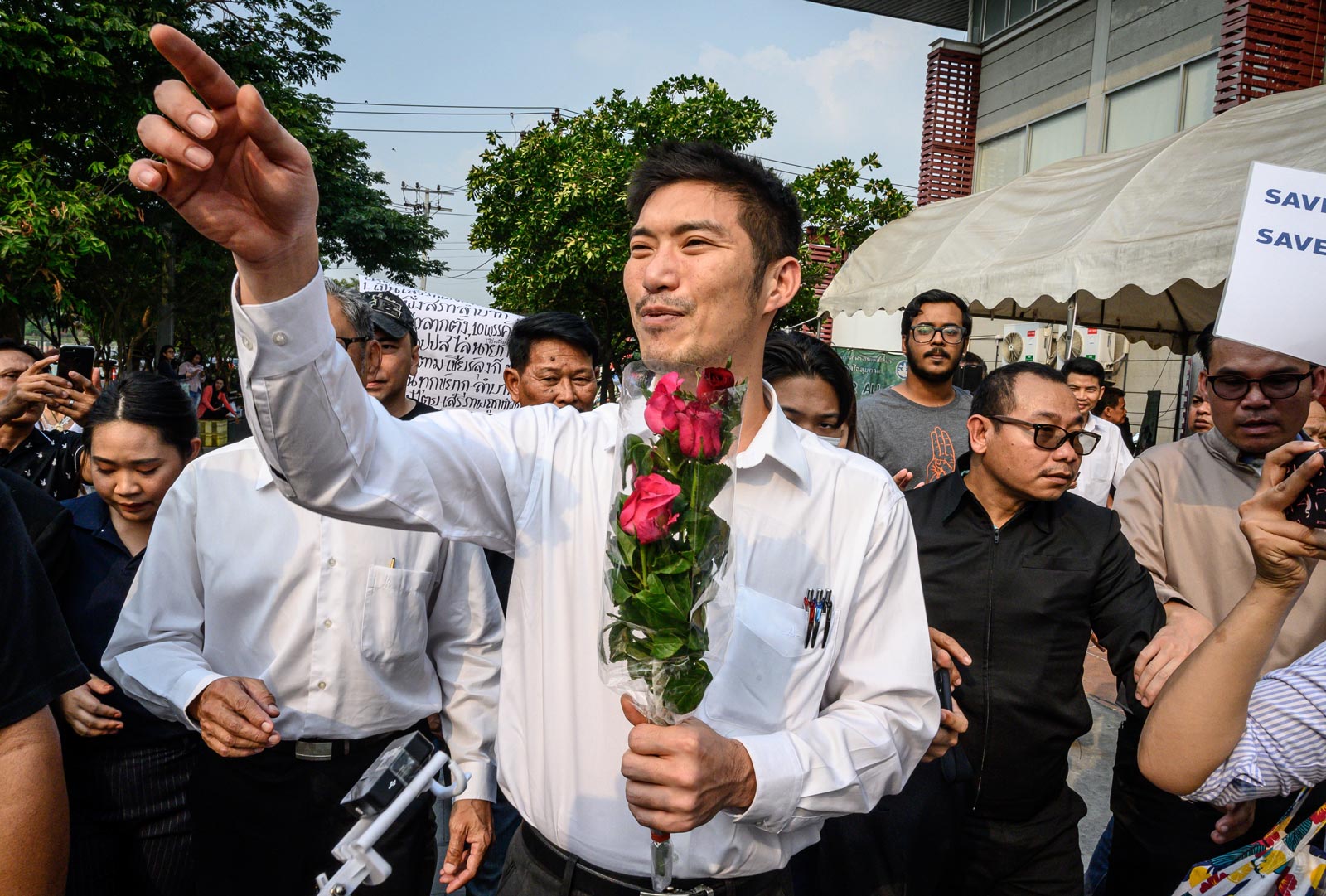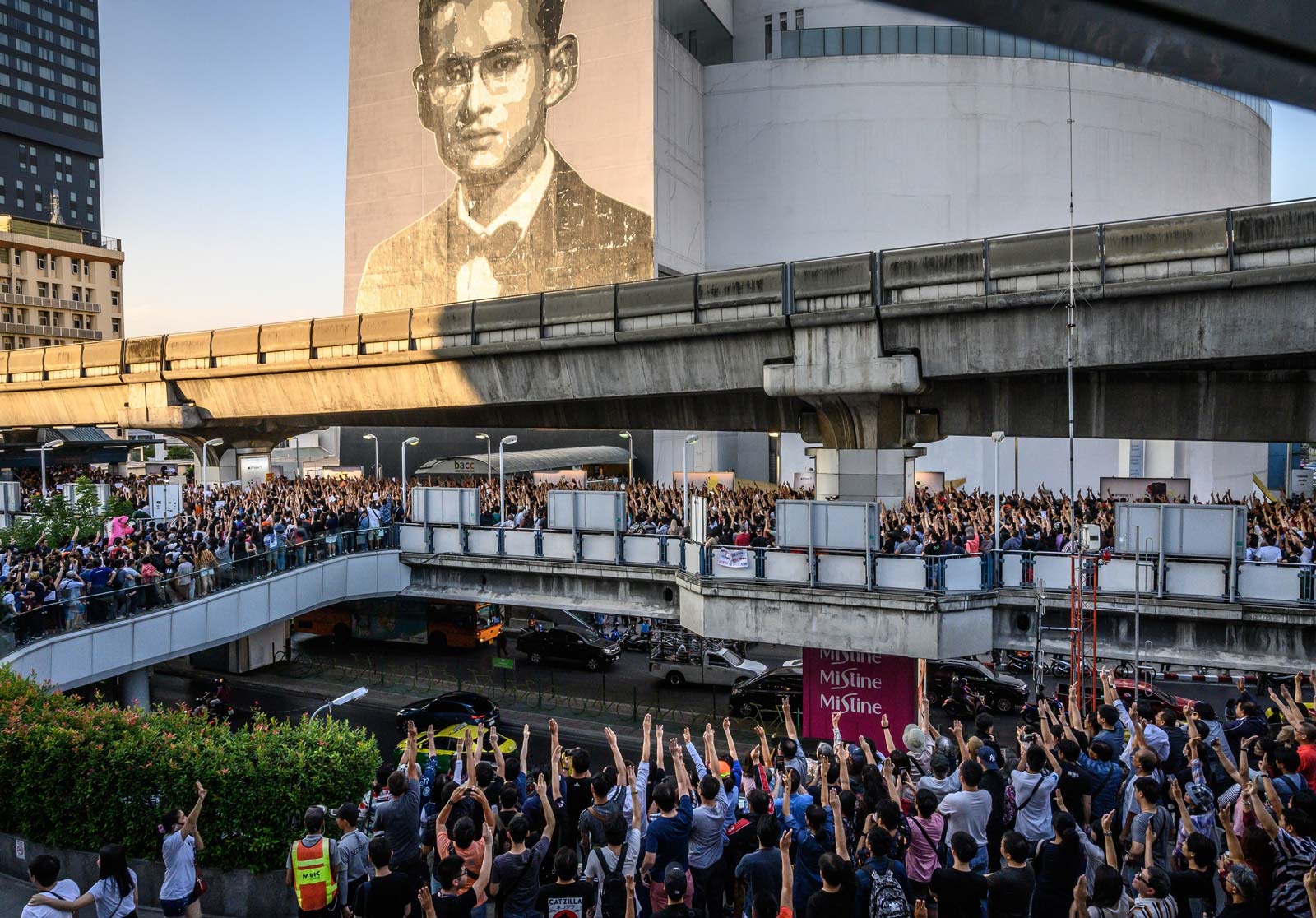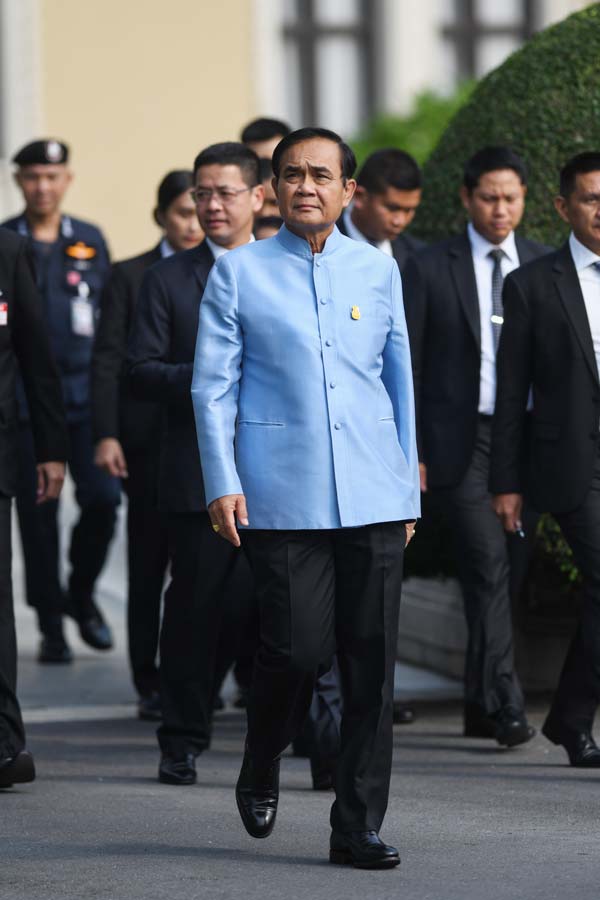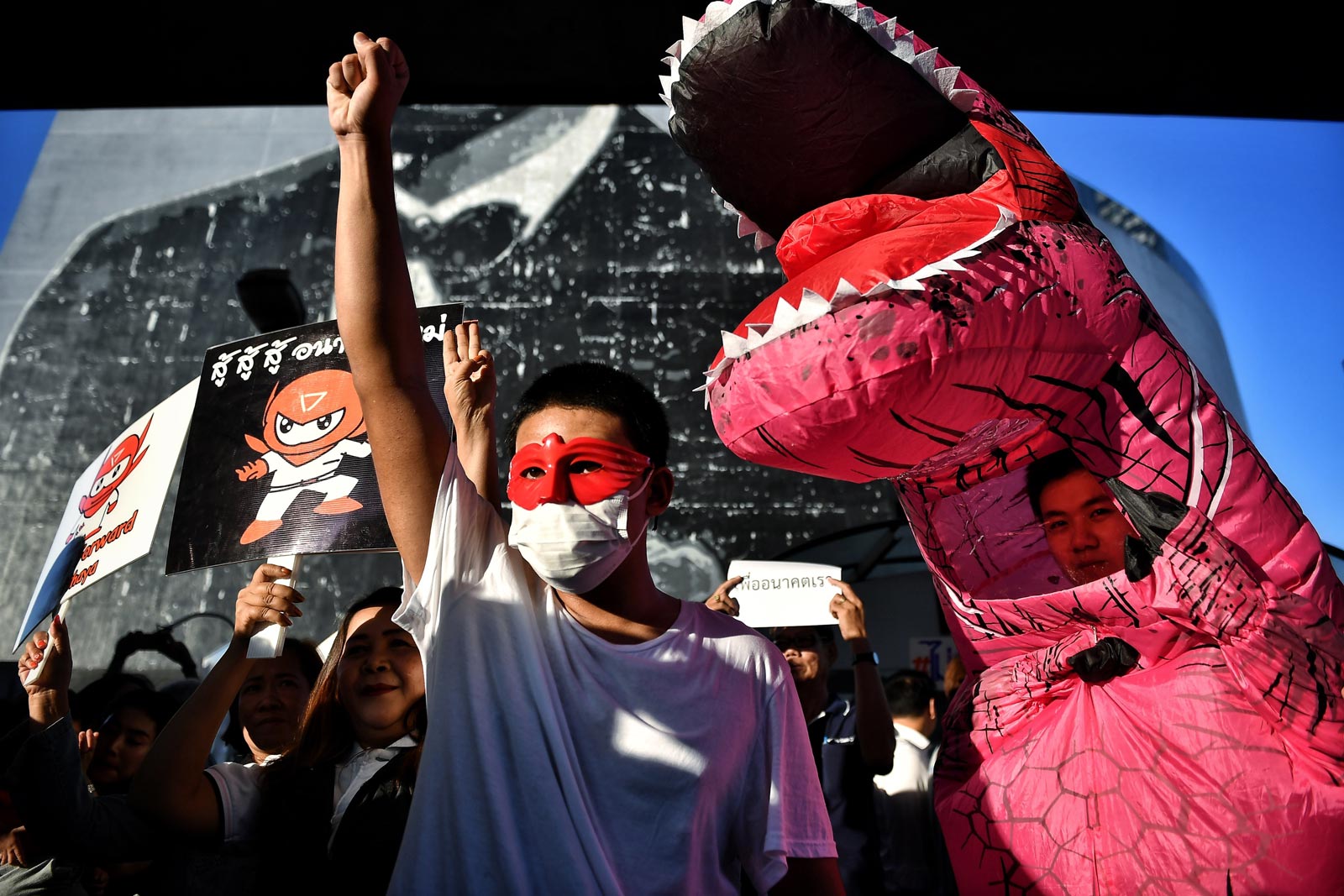Editor’s note: Future Forward Party was dissolved by the Thai Constitutional Court in a Feb. 21 decision. The court ruled Mr. Thanathorn had broken political finance laws by providing 191.2 million baht ($6.1 million) to fund his party’s election campaign last year. Mr. Thanathorn has contested this money was loaned, not given, to the party, but the court rejected this classification.
Thailand’s 2019 general election gave citizens their first taste of the democratic process after years of military rule. Even though many were skeptical of the contest, the upstart, anti-junta Future Forward Party (FFP) still charged to a strong showing by capturing the imagination of both the youth set and seasoned Thai activists alike hoping for a true democracy.
The nearly-brand-new party, established only a year before the election – Thailand’s first since the 2014 military coup – immediately won foes in the kingdom’s entrenched establishment. The party’s reformative agenda has since been largely stymied by the courts and regulatory institutions that uphold the country’s military-drafted constitution approved by a 2016 referendum.
Having already withstood a litany of charges, FFP might survive its year-long battle for survival in the powerful Constitutional Court. It also might not, and crumble under the force of a court-ordered dissolution that could come after a decisive February 21 ruling.
Saowanee T. Alexander, a political observer and assistant professor of sociolinguistics at Ubon Ratchathani University, told the Globe she was “pessimistic” on the day before the verdict as she assessed the situation facing FFP.

When looking back on Thailand’s political history, in which parties that buck the military-elite establishment have been dispatched with some combination of violence and bureaucracy, Alexander “wouldn’t be surprised” to see the new kids on the block meet a similar fate, whether it comes from this latest trial or another down the road.
“There are so many challenges ahead – if they don’t get you now, they’ll get you later. It’s not a matter of how, it’s when, so Thailand is like a time bomb.”
This latest challenge comes as FFP leader Thanathorn Juangroongruangkit, a former businessman, stands accused of breaking Thailand’s political finance laws by providing a 191.2 million baht ($6.1 million) loan to fund his party’s election campaign last year. Thanathorn maintains he loaned the money, not donated it – a crucial distinction in its legality. Even still, the national court and the powerful Election Commission regulatory body have pursued the case to this ultimate decision that could break up the party for good.
Kunthida Rungruengkiat, a member of the FFP executive committee, said party members won’t give up on parliament, even if their own party is dissolved. She pointed to the ongoing push from the coalition of FFP and Pheu Thai Party, the largest opposition group in parliament and former party of the ousted Prime Minister Thaksin Shinawatra, toward a closely watched vote of no-confidence against the government of Prime Minister Prayut Chan-o-cha.
Thanathorn himself earlier this week also told the Globe that FFP MPs would switch to a pre-designated party and continue the fight “only with a new banner”.
A lot of people who came to the event were against the dictatorship, so the people in the government, especially the leading party Palang Pracharath, should have gone to the event to actually listen to the people they should represent
Student activist Sirin Mungcharoen
Still, the limits in parliament are clearly outlined for those who would upset the status quo.
Kunthida spoke by phone just after her party was defeated in a parliamentary vote to explore ways to deal with military figures who launched the last coup – a group led by Prayut – while curbing their ability to stage another. Though failed motions like the one that came just minutes earlier can sharply outline the limitations of parliamentary change, Kunthida said she was “positive on the reform” movement.
“It seems like what happened today is a really good example of if we can really achieve the big picture or not,” she acknowledged, adding “I think it’s the question of when that [change] will happen. We’re in the middle of that process and there will be time when society is quite ready, in my opinion, but the establishment might not be ready yet to face the change.”
Kunthida said the current agenda of FFP, which includes grassroots organising and education for citizens and proposals like ending Thailand’s compulsory military service scheme, will continue no matter what happens in court on Friday.
Others have also made the argument that, despite the resistance applied to FFP, the election last year marked a reopening of the democratic space that has allowed opposition activists and politicians to build momentum. Consequently, regardless of Friday’s outcome, dissolution or not, there’s a generation of young anti-junta activists, emboldened by FFP’s success, readying to lead the charge.
If you’re going to hold a “run to oust the uncle”, it helps if the uncle is in attendance.
That was the idea earlier this year in Bangkok when Sirin Mungcharoen and her friend, fellow activist Tanawat Wongchai, formally invited Thai Prime Minister Prayut and other government figures to attend a protest against their rule. The demonstration, also known as the “run against dictatorship,” drew thousands in Bangkok and elsewhere to call for democracy in public parks. Prayut is sometimes known affectionately (or not) as Uncle Tuu but, for many young Thais, he has another title: Dictator.
“We wanted to say that we are open, that our event is open for everyone,” Sirin, 21, told the Globe. “A lot of people who came to the event were against the dictatorship, so the people in the government, especially the leading party Palang Pracharath, should have gone to the event to actually listen to the people they should represent.”
Even when the push full democracy in Thailand appears to have foundered in parliament with the shackling of FFP, anti-junta activists have pledged to carry on the fight in whatever venue they can find.

Parit Chiwarak is among the more prominent of them. Better known by his nickname, Penguin, the 21-year-old Thammasat University student got his start in political activism when he was just 17.
“Back then, I was in high school, and at the time we were under the total military regime,” Parit said. “One of the first things they tried to get their hands on was the education system.”
The new lesson plans rolled out by the military government included carefully designed Thai civics that reinforced the values and narratives of the ruling junta. For Parit, it was that, plus accompanying cuts to education funds, that pushed him to speak out.
“When I participated in activism for the first time, it was in protest against the soldiers’ curriculum,” he said.
The protests didn’t stop there. Now, his social-media-savvy protests have garnered more than 24,000 followers on Facebook, displaying an ability to organise behind the scenes while spurring people into the public space.
Parit, a founder and now leader of the Student Union of Thailand, has organised and participated in numerous protests, including December’s so-called “flash mob” demonstration on the Bangkok’s downtown Pathumwan skywalk. That one landed him, once again, in legal trouble as he and a group of others, including Thanathorn, were accused of having caused a litany of offences against public gathering law.
From that event and others, Parit says he now has four charges against him as a result of his activism. These cases themselves aren’t necessarily severe when taken individually, but the net effect adds up to what he sees as an exhaustion campaign in which activists are hauled in, over and over, to face a never-ending gauntlet of legal matters.
“The government has changed the strategy for suppressing us,” he said. “During the full regime years [2014-2019], that five years under the regime, they tried to suppress us by putting serious charges on literally anyone so that if you cause fear in society – back then, everyone could be charged.”
Now, he says, the punishment isn’t as outright. It’s more of a death by a thousand cuts.
“They know they can’t inflict fear in such harsh strategy, so now they try to wear us down. I think they know there aren’t so many activists working in the movement, so they identify who’s a stakeholder and who’s a leader, and they try to wear them down by putting, not necessarily such serious charges, but many charges.”
The drain on time, money and other resources is an exhaustion campaign, Parit says, one designed to frustrate and intimidate those who get sucked into their vortex. He also says he’s received death threats, and was forced to lie low for a while when a friend and fellow activist, Sirawith Seritiwat, was beaten by unknown assailants on the street in broad daylight.

Other activists have complained of similar tactics. Chonthicha Jangrew, a Bangkok-based activist, previously told the Globe she’d been targeted with seven legal cases – including a sedition charge in which Thanathorn is also co-defendant – related to protests and demonstrations. Chonthicha, a co-founder of the activist Democracy Restoration Group, also said police and military representatives had visited her family home more than 50 times as part of an intimidation strategy.
But even with the legal headaches, many still believe the election has opened the door to more activism and a stronger pro-democracy sentiment.
Sirin, a student council executive at Chulalongkorn University whose early human rights career includes work with Amnesty International Thailand, said the events since the election had only made her more confident in the cause.
“I think it makes me feel the government, the authority, is weaker than I thought,” she said. “They’re so easily scared by the new power, the power of the youth, the power of the [FFP].”
Speaking from his own experience, Parit said organizing potential among the youth had noticeably increased in the years he’d been active.
“When I enrolled in university, my freshman year, it was quite difficult to recruit new members for our organisation. They were all in fear, they said they agreed and supported what we were doing, but they were too afraid to join,” he said.
“They were afraid of being arrested, being charged, being blacklisted. But now, I’ve noticed that my friends also are more and more willing to join this movement … Even more, I’ve found that the young people in high school, or in elementary school, are getting more and more active.”
Omar Noonanunt, another Thammasat University student and a representative of the WeWatch election monitor group, said the ability to get people into the streets with protests is the real measure of political strength in Thailand.
“The ultimate goal is trying to grip power to mobilise the people, and how many people is the mark of success,” he said.
Though recent protests, including last month’s “run against dictatorship” demonstrations, drew large numbers into the public space, Noonanunt said he was waiting for even bigger action. “I don’t take protests seriously until you sleep in, really occupy the street.”
Thailand has been no stranger to those kinds of mobilisations in the past, but even those well-versed in the history are adapting to new political terrain.
Eakpant Pindavanija is the director of the Institute of Human Rights and Peace Studies at Mahidol University in the Bangkok suburbs. He says he often gets questions from people hoping to draw from historical experience to navigate what’s happening now.
“What I tell them is that we’re all experiencing this together,” he says with a laugh. “This isn’t getting close to what we’d call a democracy. We have an elected government, we have parliament – that is something better than the junta government, military rule. But the other things, not much has changed, because there’s a continuity for authoritarian groups.”
Eakpant still has hopes the parliament can deliver change in Thailand, but admits that hope is fraught with peril, especially given the lessons of the past year with FFP. He described the opposition group as “innovative” in breaking the mould of Thai politics – long divided between the anti-military Red Shirts and the Yellow Shirt royalist camp.
He offered a word of warning to “all-powerful” leaders, saying they should be cautious in their suppression of democratic tendencies among the public.
“The reactions of youth to disenfranchisement is different,” he said. “The new generation is mainly on social media, on Twitter and everything else. But that doesn’t mean there’s no action on the street. It depends on their tolerance and how much their comfort zone is invaded.”
For his part, Thanathorn has all but promised more protests to come. He told the Globe earlier this week that if his party is dissolved by the Constitutional Court on Friday, the public can expect to see renewed protests as soon as March. Thanathorn also said he and his second-in-command Piyatabutr would lead a “social movement” to push action from outside parliament.
While less than two days before Friday’s ruling, Thanathorn told the Bangkok Post he was confident his party would survive this latest challenge, James Buchanan, a researcher of Thai politics with City University of Hong Kong, was less optimistic.
“It seems quite certain,” Buchanan told the Globe, regarding FFP’s dissolution. “I wouldn’t say definite, but at some point I’d say yes. I don’t know if it’ll be this next [court case] that’s upcoming.”

There were some young people who were a little naive, thought their time had come, they’d get rid of Prayut, but then it didn’t really happen like that
James Buchanan, a researcher of Thai politics with City University of Hong Kong
Buchanan’s research focuses on mass mobilisations. He assessed the recent arc of Thai politics through that lens, looking to disillusionment after last year’s election as a potential trigger for future action.
“I think there were some young people who were a little naive, thought their time had come, they’d get rid of Prayut [Prime Minister Chan-o-cha], but then it didn’t really happen like that. I think some of them were quite devastated, and then that also kind of faded into anger, grievance, possibly turning them from voters into potential activists.”
He thought there could be fertile ground for that conversion, naming as key factors the apparent mood of simmering public resentment and the resources now available to the public, including the leadership of Thanathorn and other emerging figures. Another deciding factor could be the alliances between a new generation of protesters and the more tested mettle of the older Red Shirts.
“Now there’s come along someone new, someone fresher, who is idealistic and could potentially do that, play that leadership role,” Buchanan said of Thanathorn. “Whether or not he will, that’s the quesiton. There are a lot of people now who are ready to be mobilised. Now it’s up to Thanathorn [or someone else] to decide whether he wants to mobilise them.”
Alexander had a similar view on the conditions needed for effective mobilisation.
“These people, the younger ones, were not activists before. They’re not activists now. They might vent on social media, but they’re not generally the type to take it to the streets, like the Red Shirts, who are largely associated with Pheu Thai Party. So to turn this into a mass movement, a street protest type of movement, [FFP] needs more support than just younger people or a few hardened, seasoned activists.”


